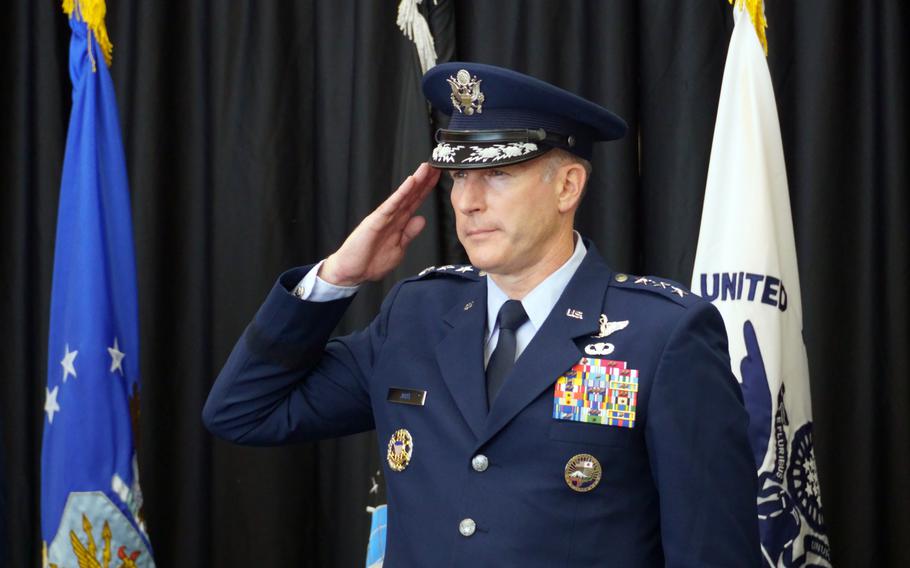
Air Force Lt. Gen. Stephen Jost takes command of U.S. Forces Japan and 5th Air Force at Yokota Air Base in western Tokyo, Oct. 8, 2024. (Akifumi Ishikawa/Stars and Stripes)
YOKOTA AIR BASE, Japan — The top American general in Japan touted a sweeping command reorganization and highlighted growing regional threats from China in a weekend op-ed published by one of Japan’s most-read newspapers.
Air Force Lt. Gen. Stephen Jost outlined the transformation of U.S. Forces Japan and its evolving partnership with the Japan Self-Defense Forces in a Saturday opinion piece in the Asahi Shimbun headlined “Advancing the Alliance: USFJ, JSDF transform future of Indo-Pacific Security.”
The first phase of restructuring USFJ from a liaison-focused entity to a more operationally integrated command was announced March 30 by Defense Secretary Pete Hegseth during a visit to Tokyo.
“Moving from a headquarters primarily charged with an alliance management mission to one that, in time, will integrate and synchronize operations that span the spectrum of operations from humanitarian assistance, disaster relief and armed conflict is a monumental task,” Jost wrote.
The goal, he said, is to improve warfighting effectiveness alongside Japan and enhance the alliance’s deterrence posture. In April, USFJ — headquartered at Yokota Air Base in western Tokyo — announced plans to open a satellite office at Akasaka Press Center, a U.S. Army installation in central Tokyo near Japan’s Ministry of Defense.
“The security, freedom and prosperity in the Indo-Pacific face increasing challenges from adversarial nations, primarily the People’s Republic of China, and I can tell you firsthand that these threats are only intensifying,” Jost wrote.
In a parallel move, Japan’s Ministry of Defense in March activated its new joint operations command — considered a counterpart to the restructured USFJ.
Jost described the creation of Japan’s command as a historic milestone signaling a more agile and integrated security approach.
“Japan’s ability to provide a more comprehensive and timely response to emerging threats and natural disasters will significantly increase,” he wrote.
Jost noted that the U.S. reorganization is happening alongside Japan’s growing defense budget and military capabilities, including efforts to acquire long-range counterstrike weapons. Japan test-fired a short-range, surface-to-ship missile from Hokkaido on June 24 and plans to deploy cruise missiles, including U.S.-made Tomahawks, later this year.
To support deeper collaboration, USFJ recently formed a team to coordinate with Japan’s new command, Jost said. Further changes to the U.S. command are being developed in coordination with U.S. Indo-Pacific Command.
“These shifts in command and control are occurring against the backdrop of intensifying regional concerns, including a rise in coercive and unprofessional military maneuvers in all domains of operations,” Jost wrote. “These activities emphasize the necessity for a more robust U.S.-Japan security alliance.”
USFJ, in a statement emailed Monday by spokesman Air Force Col. John Severns, said the new liaison team will serve as a key bridge between the U.S. and Japanese command structures.
“This is the time for General Jost’s op-ed to explain our transformation to the people of Japan,” the statement said.
The reorganization comes amid questions about U.S. commitment to the alliance, Brad Glosserman, a senior adviser at the Hawaii-based Pacific Forum think tank, said by email Friday.
Jost’s op-ed, Glosserman wrote, serves as both a vote of confidence in the Self-Defense Forces’ reorganization and a signal of continued American support.
“U.S. military planners want Japan to be comfortable with what the U.S. is doing and they are doing their very best to quell concerns that it might anticipate a reduced commitment to Japan and the alliance,” he said.
The article is intended to show Asahi’s wide range of readers that U.S. policy won’t be changing as Japan heads into national upper house elections in July, said Ken Jimbo, a professor of international relations at Keio University in Tokyo.
Jost, in his op-ed, indicated his intention to “drastically increase the level of integration of the Japan-U.S. alliance,” Jimbo said by phone Monday.